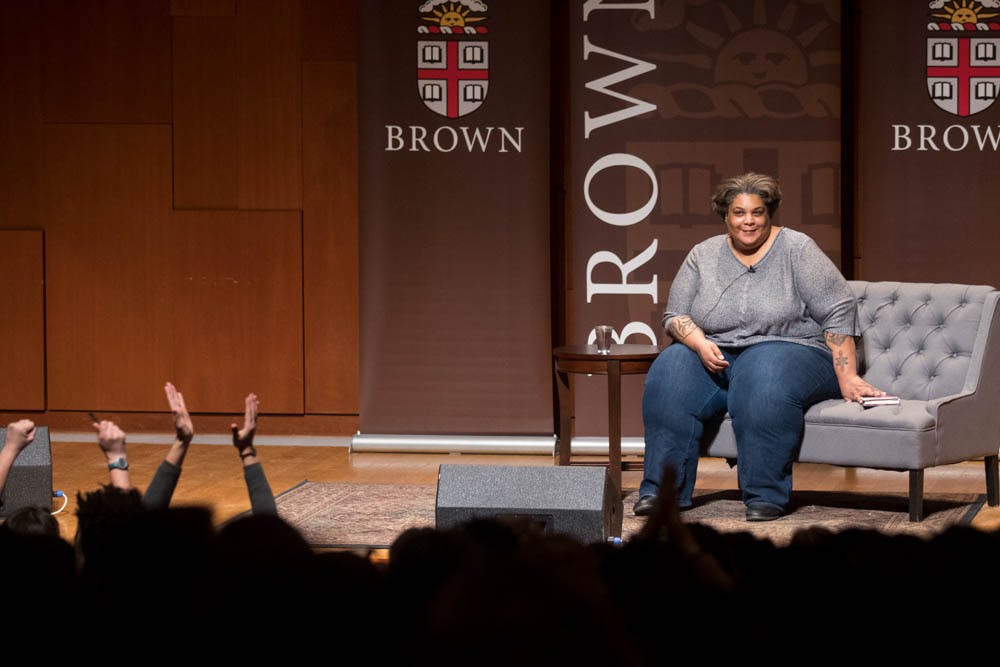“I want your fight. I want your din,” urged Roxane Gay as she spoke of the current political climate under President Donald Trump’s administration and the crucial need to take action. On a cold Feb. 14 evening, Gay was the motivational and bold valentine for a packed Salomon Center, filling the space with her unfiltered humor, rawness and urgency.
Organizers of the event, Margaret Goddard GS and Ida Yalzadeh GS, brought Gay to Brown through the sponsorship of the Department of American Studies. Goddard and Yalzadeh hoped to “create a space for critical engagement with popular culture and attention to the role of academics in public discourse,” they wrote in an email to The Herald.
The feminist writer, professor, editor, commentator and author of New York Times best-seller “Bad Feminist” began by reading two pieces from her most recent publication, “Difficult Women.” The first reading humorously utilized yogurt as a symbol of feminist strength in her marriage, underscoring the powerful influence of having confidence. Her second piece spoke of a “gated” community in Naples, Florida. The gates represent not only physical barriers put up by members of a wealthy community who “all looked the same,” but also the community members’ intolerance that prevented them from understanding those with identities different from their own.
Setting the ambience, Gay then plunged into her talk — one that was politically charged from her first breath.
“I’ve had the cause to write a lot of nonfiction recently, because what’s going on in this country is a horror that not even fiction writers can make up,” Gay prefaced. Her talk opened with her reaction to the election results, which went from feeling “stunned, and then ashamed of being so stunned, and so unprepared to face American reality.”
“I kept wanting to scream, ‘Don’t you know what’s going on?’” She expressed frustration at the abundance of supporters of the Administration as she witnessed actions such as Trump’s immigration ban, charge to dismantle the Affordable Care Act, and lying to news media.
Gay said she realized she had to figure out where to go from her initial reactions. From her perspective as a writer, she pointed out the importance of language and the misuse of certain sayings throughout the election season, such as “When they go low, we go high,” “Love Trumps Hate” and “Nasty Woman.”
“Millions of people went on to parrot these words,” she said, explaining that these phrases were not always applicable or effectively fighting for the right cause. “We needed to get uncomfortable, and that means moving beyond tidy words.”
Gay also touched upon identity politics, describing them as “an accusation that implies we can somehow separate ourselves from the very things that make us who we are.”
“My identity is political because so much of who I am is subject to public discourse,” she said. “The work I do is for the people who don’t have the privilege that I do: to stand, speak and fight with them.”
In closing, Gay encouraged students to fight for change by participating in the 2017 local elections, midterm elections, engaging in social and economic protests, running for office and “using words with care and intent.”
In the question and answer session, Gay continued to speak with honesty, lacing her advice with humorous sarcasm that struck a note with many students, who responded with reverberating laughter, snaps and shouts of enthusiasm.
“Don’t waste time with people who are unreachable,” she emphasized. “Racism isn’t a side, it’s an opinion. It’s hate, and we don’t have to listen to that.”
When asked about her thought process in pulling from Simon & Schuster after they agreed to publish a book by alt-right author Milo Yiannopoulus, she said that she was proud of this action, adding that Yiannopoulus’ followers were believers in racism and could potentially commit acts of violence in his name.
“I’m just one person and I can’t do a whole lot, but damn it, this is one thing I can do,” she said.
Gay ended her session by answering a question about the pressures of body image that are placed on people, particularly females.
“The choices you make for your body are yours,” she said, as the lecture concluded and the audience rose to a standing ovation.





